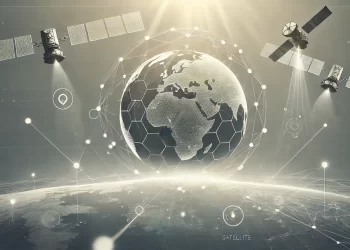In a landmark achievement, Northwestern University researchers have successfully demonstrated quantum entanglement using fiber optic cables actively carrying internet traffic. This breakthrough suggests that existing telecommunications infrastructure could support quantum computing, sensing, and communications, eliminating the need for specialized networks. Published in Optica, the research lays a foundation for integrating quantum technologies into real-world applications, with far-reaching implications, including military advancements.
Quantum teleportation, a key process demonstrated in the experiment, allows quantum information to be transferred across distances instantaneously without traveling through physical space. This capability has profound military applications, particularly in secure communications. Prem Kumar, a professor at Northwestern University, emphasized, “Quantum teleportation has the ability to provide quantum connectivity securely between geographically distant nodes.” The secure nature of quantum states, which cannot be intercepted without detection, makes them invaluable for military use.
Researchers placed quantum data within specific wavelengths in the fiber optic spectrum to avoid interference from classical internet traffic. Jordan Thomas, a Ph.D. candidate in Kumar’s lab, explained, “This allowed us to achieve teleportation alongside very high-power classical communications that could carry terabits per second data rates without crosstalk disrupting the system.” This method of integrating quantum and traditional data streams could provide militaries with the ability to maintain quantum-secure communications without compromising existing communication infrastructure.
The military potential of quantum technology extends beyond secure communications. Distributed quantum computing, made possible by quantum teleportation, could enable real-time battlefield analytics, faster decision-making, and optimized logistics. For example, commanders could use quantum networks to process massive amounts of battlefield data instantaneously, improving operational planning and response times.
Quantum sensing, another potential application, offers enhanced capabilities for detecting and tracking adversaries. Quantum radar, for instance, could overcome traditional radar limitations, such as stealth technology, by using entangled photons to detect objects with unparalleled precision. Similarly, quantum-based navigation systems could provide accurate positioning even in environments where GPS signals are blocked or jammed—a critical advantage in modern warfare.
The researchers’ next steps include testing quantum communication over longer distances using real-world internet networks. Additionally, they aim to demonstrate entanglement swapping, a process that involves transferring quantum states between particles that never physically interacted. Thomas described this as “another application needed to achieve operations such as distributed quantum computing, sensing, and quantum repeaters.” Such advancements could support military networks spanning global theaters of operation, enabling seamless coordination across continents.
The implications for defense systems are profound. A quantum-secure communication network could shield sensitive military data from cyberattacks, ensuring operational integrity in an era of increasing digital warfare. Furthermore, distributed quantum computing could empower artificial intelligence systems used for autonomous vehicles, surveillance, and threat assessment, offering militaries a strategic edge.
The use of existing fiber optic infrastructure for quantum applications is a game-changer for defense budgets. By leveraging current telecommunications systems, militaries can deploy cutting-edge technologies without incurring the enormous costs of building new infrastructure. This approach ensures rapid deployment and scalability, critical in maintaining technological superiority over adversaries.
As quantum technologies evolve, their integration into military systems will redefine modern warfare. From secure communication channels to advanced sensors and computational tools, quantum science offers transformative potential. By combining existing infrastructure with innovative quantum solutions, militaries worldwide stand on the brink of a new era in defense capabilities.








